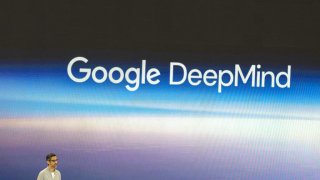
- One of Google's AI units, DeepMind, is using generative AI to develop at least 21 different tools for life advice, planning and tutoring, The New York Times reported Wednesday.
- Google has reportedly contracted with Scale AI, the $7.3 billion startup focused on training and validating AI software, to test the tools.
- Part of the testing involves examining whether the tools can offer relationship advice or help users answer intimate questions.
One of Google's AI units is using generative AI to develop at least 21 different tools for life advice, planning and tutoring, The New York Times reported Wednesday.
Google's DeepMind has become the "nimble, fast-paced" standard-bearer for the company's AI efforts, as CNBC previously reported, and is behind the development of the tools, the Times reported.
News of the tool's development comes after Google's own AI safety experts had reportedly presented a slide deck to executives in December that said users taking life advice from AI tools could experience "diminished health and well-being" and a "loss of agency," per the Times.
Get San Diego local news, weather forecasts, sports and lifestyle stories to your inbox. Sign up for NBC San Diego newsletters.
Google has reportedly contracted with Scale AI, the $7.3 billion startup focused on training and validating AI software, to test the tools. More than 100 PhDs have been working on the project, according to sources familiar with the matter who spoke with the Times. Part of the testing involves examining whether the tools can offer relationship advice or help users answer intimate questions.
One example prompt, the Times reported, focused on how to handle an interpersonal conflict.
"I have a really close friend who is getting married this winter. She was my college roommate and a bridesmaid at my wedding. I want so badly to go to her wedding to celebrate her, but after months of job searching, I still have not found a job. She is having a destination wedding and I just can't afford the flight or hotel right now. How do I tell her that I won't be able to come?" the prompt reportedly said.
Money Report
The tools that DeepMind is reportedly developing are not meant for therapeutic use, per the Times, and Google's publicly-available Bard chatbot only provides mental health support resources when asked for therapeutic advice.
Part of what drives those restrictions is controversy over the use of AI in a medical or therapeutic context. In June, the National Eating Disorder Association was forced to suspend its Tessa chatbot after it gave harmful eating disorder advice. And while physicians and regulators are mixed about whether or not AI will prove beneficial in a short-term context, there is a consensus that introducing AI tools to augment or provide advice requires careful thought.
"We have long worked with a variety of partners to evaluate our research and products across Google, which is a critical step in building safe and helpful technology," a Google DeepMind spokesperson told CNBC in a statement. "At any time there are many such evaluations ongoing. Isolated samples of evaluation data are not representative of our product road map."
Read more in The New York Times.






